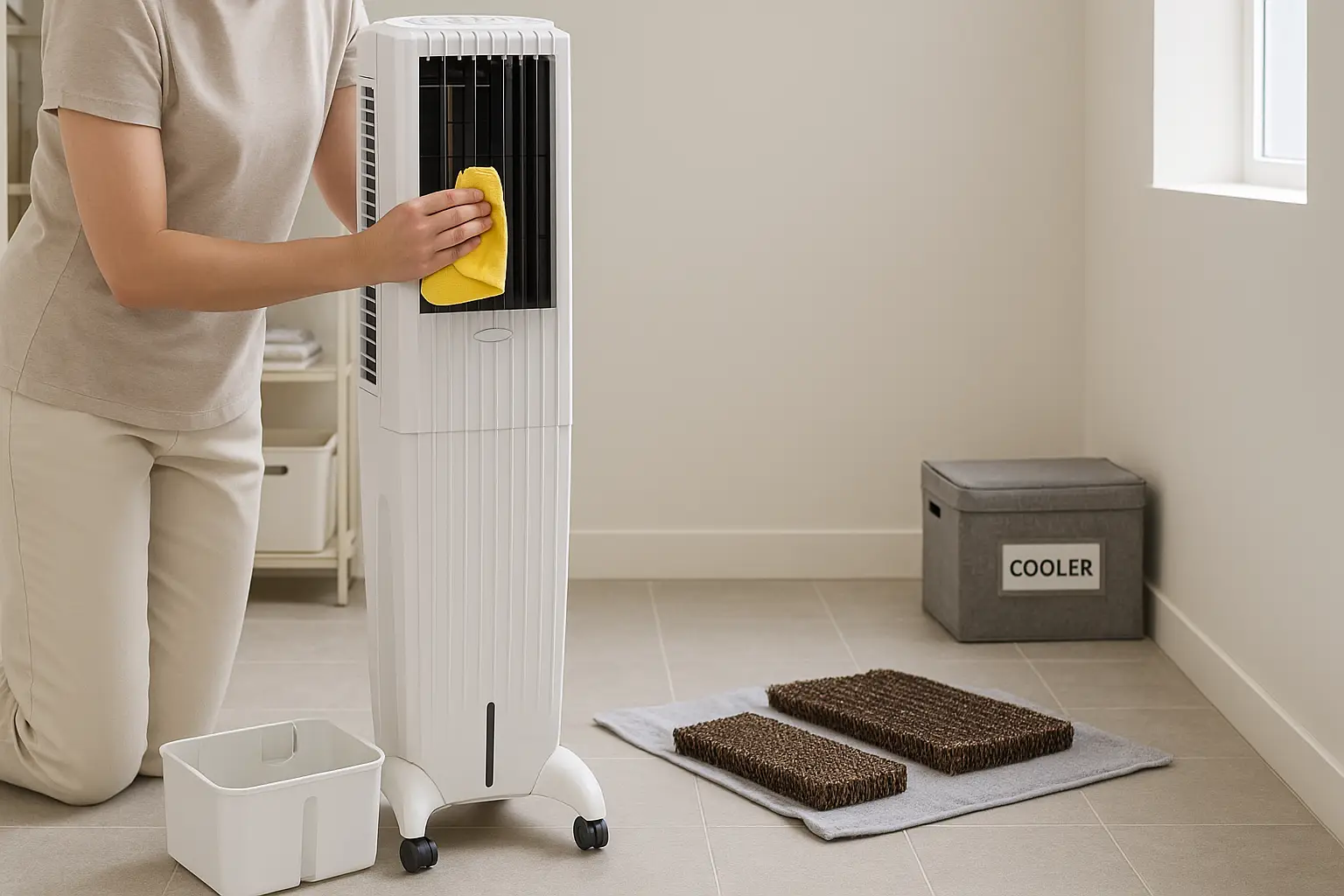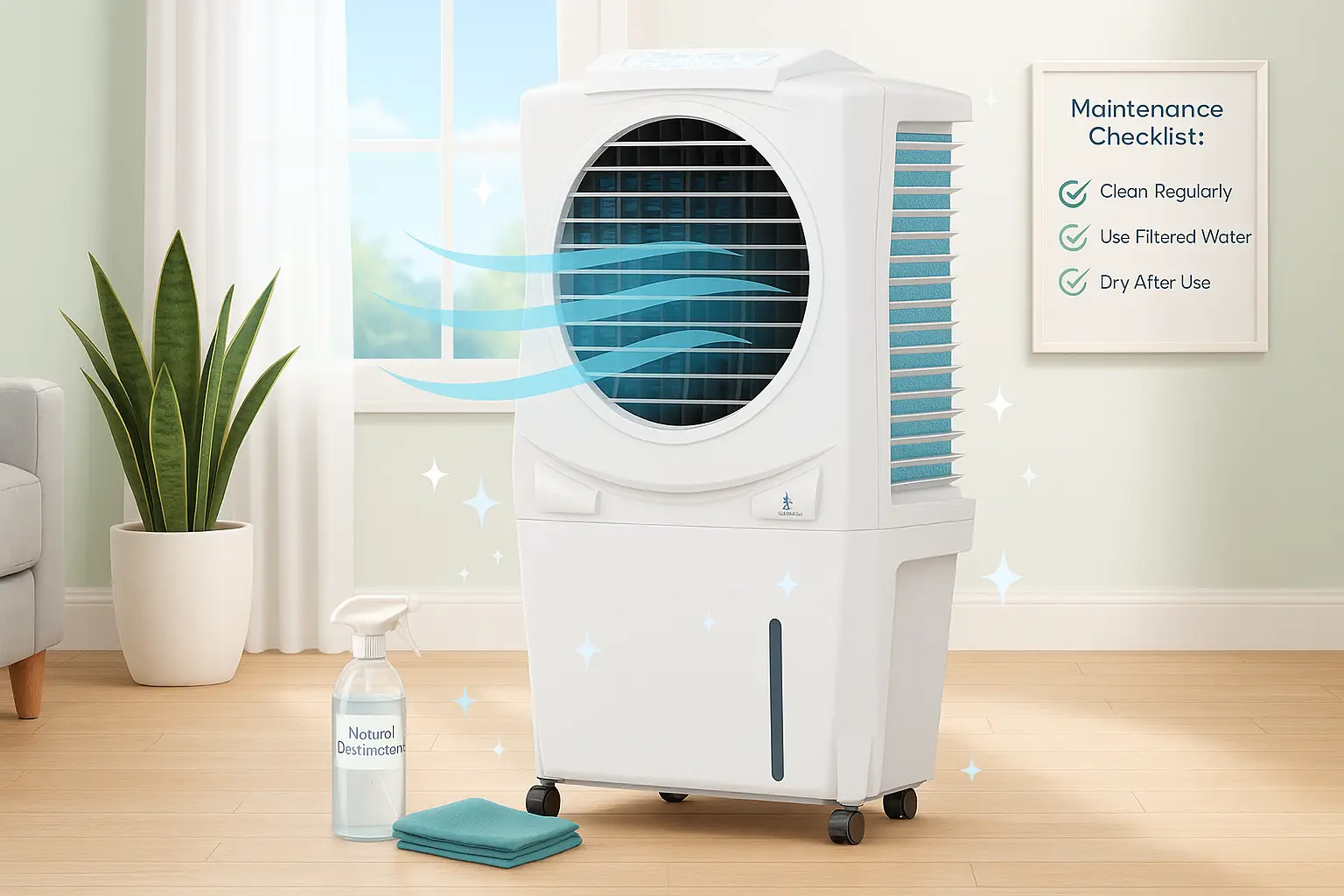Air coolers, also known as evaporative coolers, are a great way to keep your home cool and comfortable during the hot months. However, like any appliance that uses water, air coolers are susceptible to mold and bacteria growth, which can compromise air quality and even cause health problems. Mold and bacteria thrive in the damp, warm environment inside an air cooler, especially if it is not properly maintained.
In this article, we’ll discuss effective methods to prevent mold and bacteria growth in your air cooler, ensuring that your cooling system continues to work efficiently and safely.
1. Regular Cleaning and Maintenance
One of the simplest and most effective ways to prevent mold and bacteria growth is by cleaning your air cooler regularly. Over time, dust, dirt, and minerals from the water can accumulate in the unit, providing an ideal environment for bacteria and mold to thrive.
How to Clean the Air Cooler:
- Turn off and unplug the cooler to ensure safety before cleaning.
- Empty the water tank completely and rinse it with clean water to remove any debris or standing water.
- Clean the cooling pads: Use a mild soap solution or vinegar-water mix to clean the cooling pads. Be gentle while cleaning to avoid damaging the pads.
- Clean the fan blades and vents: Dust and grime can also accumulate on the fan blades and vents. Wipe them down with a soft cloth to ensure proper airflow.
- Dry all parts thoroughly: After cleaning, ensure all parts of the cooler are completely dry before reassembling it. This will prevent any excess moisture from creating a breeding ground for mold.
Regular cleaning not only prevents mold and bacteria growth but also helps maintain the cooling efficiency of your air cooler.
2. Use Water Treatment Solutions
The water you use in your air cooler plays a significant role in mold and bacteria growth. If the water is left standing for long periods, it can become a breeding ground for microorganisms.
- Water treatment products: Consider using water treatment solutions or antibacterial additives that are specifically designed for air coolers. These solutions help keep the water clean, preventing bacteria and mold from developing. They can also help minimize mineral buildup, which can clog the water distribution system and reduce cooling performance.
- Regular water changes: To prevent standing water from stagnating, replace the water in your cooler every few days, especially during periods of heavy use. This ensures that the water remains fresh and reduces the chances of bacteria and mold growth.
- Using distilled or filtered water: If you live in an area with hard water, it’s a good idea to use distilled or filtered water in your air cooler. Hard water can cause mineral deposits that promote the growth of microorganisms and reduce the efficiency of the cooler.
3. Ensure Proper Ventilation
Proper ventilation is essential for both cooling efficiency and preventing mold growth. Air coolers work best when there is a flow of fresh air, and inadequate ventilation can create stagnant, humid conditions that encourage mold and bacteria to thrive.
- Keep windows or vents open: To ensure proper airflow, make sure that windows or ventilation openings are open when the cooler is running. This allows fresh air to flow into the cooler, promoting evaporation and ensuring that the air inside the room doesn’t become too humid.
- Use the cooler in well-ventilated spaces: Avoid using the air cooler in completely sealed rooms, as this can lead to excess moisture accumulation, which is a prime condition for mold growth.
4. Use a Dehumidifier
If you live in a humid climate, moisture can accumulate inside the cooler, especially when it’s not in use for extended periods. This creates a favorable environment for mold and bacteria.
- Use a dehumidifier: A dehumidifier can help reduce excess moisture in the air, preventing dampness in the air cooler. Consider placing a small dehumidifier in the room where the cooler is used to keep humidity levels in check.
- Control indoor humidity: Aim to keep indoor humidity levels between 30% and 50%. Using an air cooler in conjunction with a dehumidifier can help maintain a comfortable and healthy environment in your space.
5. Store Your Air Cooler Properly During Off-Season
If you use your air cooler only during the warmer months, it’s important to properly store it during the off-season. If left unused, moisture can linger inside the cooler, promoting the growth of mold and bacteria.
- Dry the cooler thoroughly: Before storing the cooler for the season, ensure that all parts, including the water tank and cooling pads, are completely dry. You can also use a clean cloth to wipe down the interior and remove any remaining moisture.
- Store in a dry, cool place: When storing your air cooler, choose a dry and well-ventilated area. Avoid places that are damp or prone to high humidity, such as basements or attics.
- Remove the cooling pads: If your cooler has removable cooling pads, take them out and clean them thoroughly before storing them. Storing wet or dirty pads can lead to mold and bacteria growth.

6. Use an Air Cooler with Anti-Microbial Pads
Many modern air coolers, including Symphony models, come equipped with anti-microbial cooling pads designed to reduce mold and bacteria growth. These pads are treated with special coatings that prevent the growth of harmful microorganisms, ensuring that the air cooler continues to provide clean and fresh air.
- How anti-microbial pads work: The coating on the pads inhibits the growth of mold, bacteria, and other harmful microorganisms, keeping the air cooler clean and reducing maintenance efforts.
- Symphony coolers with anti-microbial pads: If you’re in the market for a new cooler, consider selecting a Symphony cooler that features iPure technology or similar antimicrobial treatments. These coolers are equipped with specially designed pads that actively fight against mold and bacteria growth.
7. Monitor and Maintain Your Air Cooler Regularly
In addition to cleaning your air cooler regularly, it’s important to monitor its performance to detect any potential issues that could lead to mold or bacteria growth.
- Check the water tank: Regularly inspect the water tank for any signs of dirt, algae, or foul odors. If you notice any of these, clean the tank thoroughly and replace the water.
- Check for moisture accumulation: Look for any areas of the cooler that may be retaining moisture, especially after use. Any stagnant water can lead to mold and bacteria growth.
Conclusion
Preventing mold and bacteria growth in your air cooler is essential for maintaining both its performance and your indoor air quality. Regular cleaning, proper maintenance, and ensuring proper water management are all key factors in ensuring that your cooler continues to function effectively without the risk of mold or bacteria growth.
By following these simple steps, you can enjoy a fresh, cool, and healthy environment all year round. Make sure to clean your air cooler regularly, replace the water frequently, and maintain optimal humidity levels to keep mold and bacteria at bay.
If you own a Symphony cooler, taking advantage of iPure technology and anti-microbial pads will further reduce the chances of microbial growth, providing you with safe, effective, and comfortable cooling all season long.
FAQs About Preventing Mold and Bacteria in Air Coolers
How to Prevent Mold and Bacteria Growth in Your Air Cooler
How often should I clean my air cooler?
<span style="font-weight: 400;">It is recommended to clean your air cooler every 2-3 weeks during the peak cooling season to prevent mold, bacteria, and dust buildup.</span>
Can I use vinegar to clean my air cooler?
<span style="font-weight: 400;">Yes, a mixture of vinegar and water can be used to clean the water tank and cooling pads to eliminate odors and prevent mold.</span>
Is it necessary to replace the cooling pads regularly?
<span style="font-weight: 400;">Cooling pads should be replaced at least once a year, depending on usage. If the pads show signs of wear, mold, or mildew, replace them sooner.</span>
Can I use my air cooler in a humid environment?
<span style="font-weight: 400;">Air coolers work best in dry conditions. In humid environments, they may not work as efficiently. Consider using a dehumidifier alongside the air cooler to reduce moisture levels.</span>
What happens if I don’t clean my air cooler regularly?
<span style="font-weight: 400;">Failing to clean your air cooler can lead to the growth of mold and bacteria, which can affect air quality, reduce cooling performance, and potentially cause health problems.</span>
